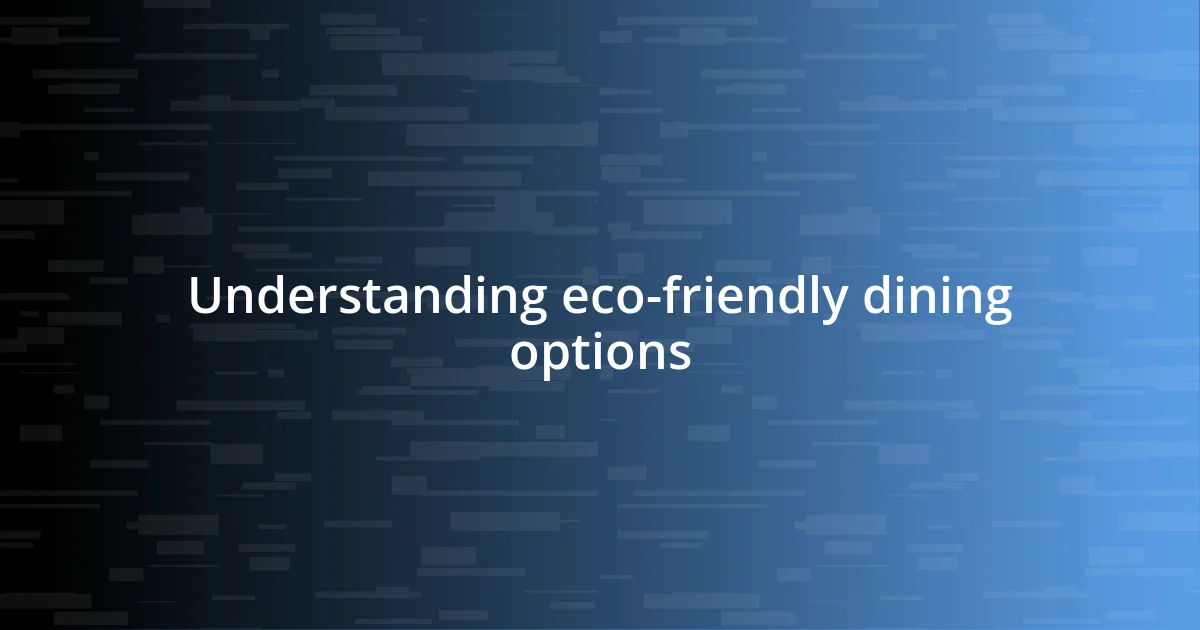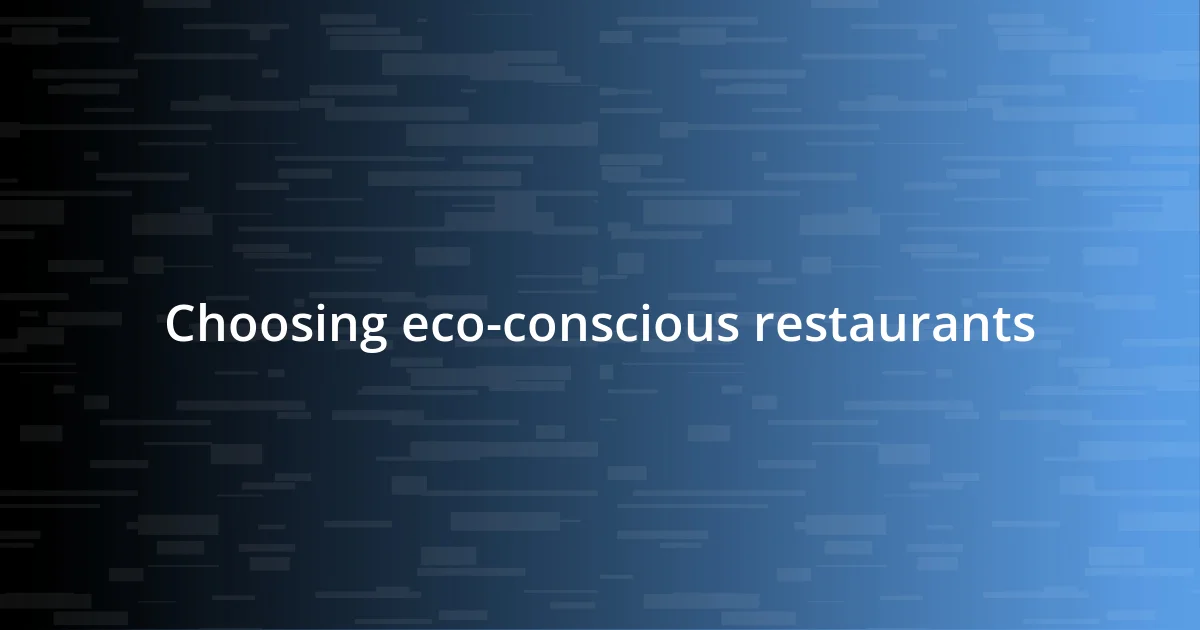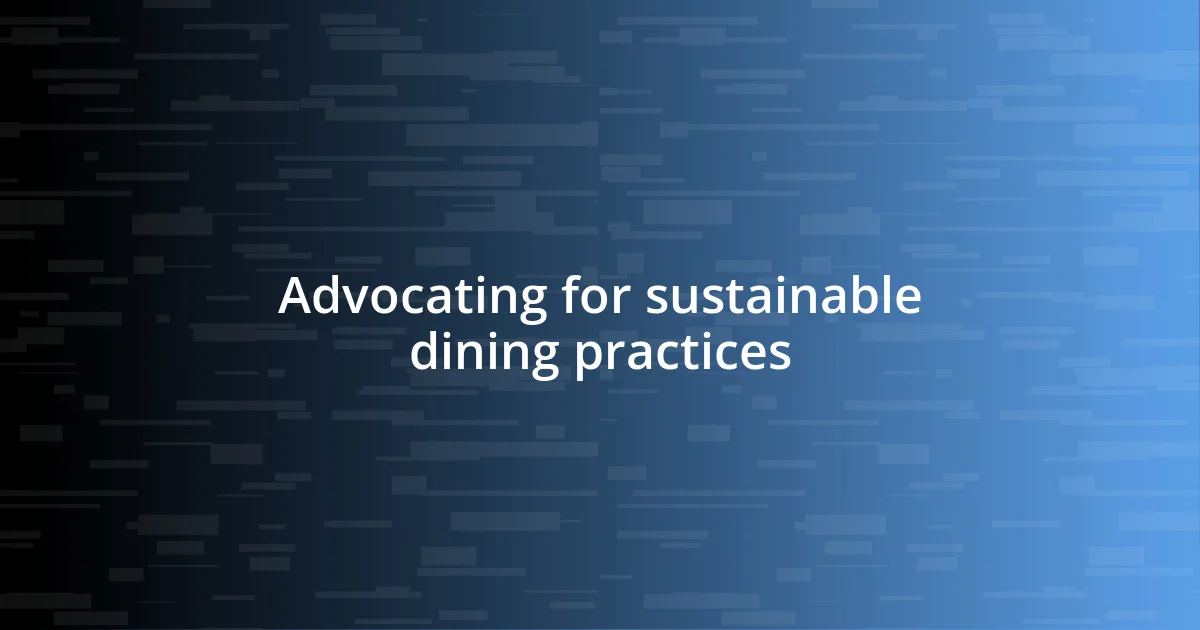Key takeaways:
- Eco-friendly dining supports local economies, promotes healthier ingredients, and reduces environmental impact through sustainable practices.
- Choosing sustainable ingredients and seasonal produce enhances flavor while advocating for responsible food sourcing and reduced carbon footprints.
- Embracing plant-based meals and reducing food waste through practical strategies like meal planning and composting leads to personal wellness and a more sustainable lifestyle.

Understanding eco-friendly dining options
When I think about eco-friendly dining options, I picture a vibrant plate filled with seasonal, locally-sourced ingredients. It’s fascinating how choosing farm-to-table restaurants not only supports local farmers but also reduces the carbon footprint associated with transporting food. Why not indulge in the freshest flavors while making a positive impact on the environment?
I remember my first experience at a vegan restaurant that emphasized sustainability. The atmosphere was lively, infused with the scent of herbs and spices that leapt from the dishes. I realized then that eco-friendly dining isn’t just about being kind to the planet; it also showcases creativity and innovation in cooking. Have you ever tried a dish that left you both satisfied and aware of its ecological footprint?
Understanding eco-friendly dining means recognizing the wider implications of our food choices. When we opt for restaurants committed to zero waste practices, we contribute to reducing landfill waste and pollution. It’s not just a trend; it’s a movement towards a sustainable lifestyle that prioritizes our health as well as the health of the planet. Isn’t it empowering to think that our dining choices can lead to a more sustainable future?

Benefits of eco-friendly dining
Choosing eco-friendly dining options brings numerous benefits that extend beyond just a meal. For instance, supporting local farms ensures that the food is not only fresher but also contributes to the local economy. I remember a time when I visited a small bistro that sourced ingredients from nearby farmers. The flavors were robust, and it felt good to know my meal helped sustain the community. Have you experienced that sense of connection through food?
Then there’s the matter of health. Eco-friendly dining often translates to meals that are free from harmful additives and processed ingredients. When I switched to more plant-based options at a sustainability-focused café, I noticed a significant boost in my energy levels. It made me wonder how much our food choices impact our overall well-being. Isn’t it fascinating how a single meal can nourish the body while also nurturing the planet?
Sustainably-sourced food also plays a pivotal role in combating climate change. By opting for restaurants that prioritize eco-friendly practices, I feel a sense of agency, knowing that each bite contributes to reducing greenhouse gas emissions. It’s not just about enjoying tasty dishes; it’s about being part of a larger change. Have you felt that mix of satisfaction and purpose that comes from making mindful dining choices?
| Benefit | Description |
|---|---|
| Supporting Local Economies | Eco-friendly dining options often support local farmers, boosting the local economy. |
| Healthier Ingredients | Many eco-friendly restaurants use fresh, organic ingredients, promoting better health. |
| Environmental Impact | Choosing these options helps reduce carbon footprints and combat climate change. |

Sustainable ingredients and sourcing
Choosing sustainable ingredients isn’t just a trend; it’s a thoughtful decision that speaks to my commitment to both good taste and environmental responsibility. I still recall that time at a pop-up farm dinner where each dish spotlighted organic vegetables and grains sourced from a local farm. The way the chef described how the ingredients were grown—without pesticides or synthetic fertilizers—brought a new appreciation for my meal. It felt remarkable to know I was part of a circle that valued awareness and care in food sourcing.
Here’s a snapshot of what makes sustainable sourcing so impactful:
- Seasonal Produce: Eating what’s in season not only tastes better but supports local agriculture and biodiversity.
- Organic Ingredients: These are cultivated without harmful chemicals, promoting healthier ecosystems.
- Wild-Caught Fish: Sourcing fish from sustainable fisheries helps preserve marine life and ensures responsible fishing practices.
- Ethically-Raised Meat: Choosing meat from humanely treated animals reduces environmental harm and fosters better animal welfare.
- Local Sourcing: This reduces transportation emissions and supports community economies, creating a ripple effect of positive impact.
Reflecting on these choices makes me feel connected to a larger movement. Each time I choose meals that align with sustainable practices, I not only savor exceptional flavors but also contribute to a healthier planet. It’s all about making small yet significant decisions that lead to a more sustainable dining experience. How do you feel about being part of this transformative journey?

Choosing eco-conscious restaurants
When I decide to dine out, I often find myself searching for eco-conscious restaurants that align with my values. Just the other week, I stumbled upon a quaint diner that proudly displayed its commitment to sustainability right at the entrance. Knowing that they prioritized zero waste practices made my meal taste even better; it felt like I was part of something meaningful. How often do you get that warm feeling of camaraderie with your food choices?
The experience of choosing these restaurants goes beyond the food; it’s about the stories they tell. I often chat with the staff about their sourcing practices, and I love hearing how they partner with local farms. One memorable conversation revealed how a restaurant I visited shifted to only using compostable packaging. I was struck by their dedication to reducing landfill waste. It’s these little conversations that deepen our connection to our meals and the environment. Have you had a similar moment that made you pause and reflect on your dining choices?
Another layer to think about is the dining experience itself. The ambiance in eco-conscious establishments often reflects a natural, inviting design, using reclaimed materials and greenery as decor. The last time I dined at a place like this, I noticed calming elements everywhere, creating a sense of peace that enhanced my overall enjoyment. It prompted me to ponder how our environment influences our dining experiences. How do you feel when you’re surrounded by eco-friendly aesthetics while enjoying your meal?

Tips for reducing food waste
Reducing food waste is something that truly resonates with me, especially given how much effort goes into growing and preparing our food. One simple tip I’ve embraced is meal planning. I take a little time each week to structure my meals based on what I already have. This not only helps me use up leftovers but also adds a bit of creativity to my cooking—like transforming roasted veggies into a hearty soup. Have you tried meal planning yourself? How did it change your approach to cooking?
Another strategy I’ve found useful is proper food storage. Knowing the right way to keep fruits and vegetables fresh can significantly extend their lifespan. For instance, I’ve learned that keeping tomatoes out of the fridge preserves their flavor, while leafy greens do best wrapped in a damp paper towel. It might seem small, but these little adjustments have drastically cut my waste. Have you ever looked into the best storage practices for your favorite ingredients?
Lastly, composting has become a game-changer for me. Instead of tossing scraps into the trash, I’ve set up a simple compost bin in my backyard. Watching the scraps transform into rich soil feels like turning waste into something valuable. It not only reduces the amount of garbage I produce but also contributes to a more sustainable life. If you compost, what’s your favorite recipe for using the nutrient-rich soil in your garden?

Embracing plant-based meals
Embracing plant-based meals has been a transformative journey for me. I still remember the first time I tried a fully plant-based dish at a cozy restaurant. It was a colorful quinoa salad bursting with flavors and textures I hadn’t experienced before. I couldn’t believe a meal without meat could taste so vibrant. Have you ever had a dish that completely changed your perspective on food?
What I’ve found fascinating is how plant-based meals often inspire creativity in the kitchen. I’ve started experimenting with different grains and vegetables, discovering new combinations that surprise me. Just last week, I whipped up a chickpea curry that not only impressed my friends but also fueled meaningful conversation about our food choices. Isn’t it amazing how sharing a meal can spark discussions about sustainability and health?
Additionally, the positive impact of embracing plant-based meals on my well-being has been remarkable. I’ve noticed that I feel more energized and balanced since shifting some of my meals to plant-based options. There’s something inherently satisfying about nourishing my body with whole foods. Have you noticed a shift in your energy or mood from changing your diet? This connection between what I eat and how I feel continues to inspire me to explore even more eco-friendly dining options.

Advocating for sustainable dining practices
Advocating for sustainable dining practices is increasingly important in our world today. One of the most meaningful changes I’ve adopted is supporting local farmers and choosing seasonal produce. I remember visiting a nearby farmer’s market and feeling a sense of connection as I spoke with the growers about their methods. This experience not only freshened my meals but also fostered relationships within my community. Have you ever thought about where your food comes from?
In my quest for sustainability, I also prioritize restaurants that source their ingredients responsibly. During a recent dinner at a local farm-to-table restaurant, I was delighted to learn that their meat suppliers focus on ethical practices. It was eye-opening to see how my dining choices can encourage businesses to operate with a smaller carbon footprint. Isn’t it empowering to know our spending can directly influence the kinds of practices we want to see in the food industry?
Moreover, I’ve begun to advocate for plant-forward options in social gatherings. When hosting friends, I savor the opportunity to showcase how delicious meatless dishes can be. Last month, I prepared a stunning array of roasted vegetables and grain bowls that got everyone talking. Conversations flowed, not just about the food itself, but the broader impact of our dining options on the planet. Have you ever considered how your gatherings might promote more sustainable eating habits?














